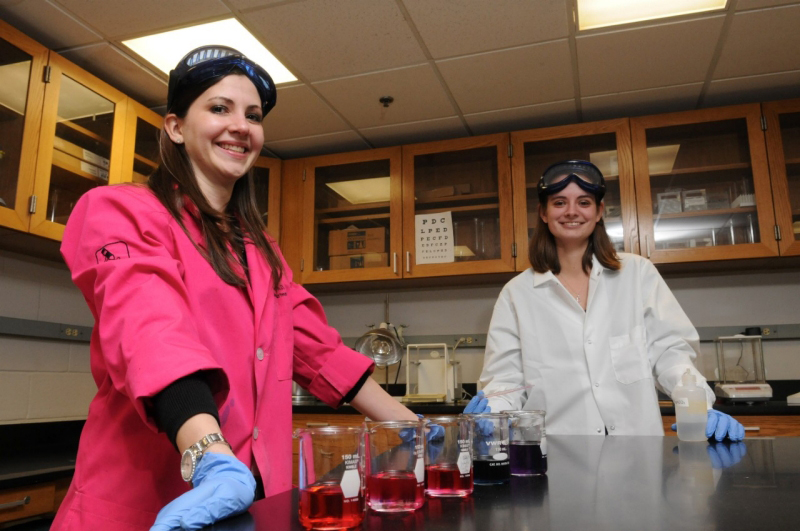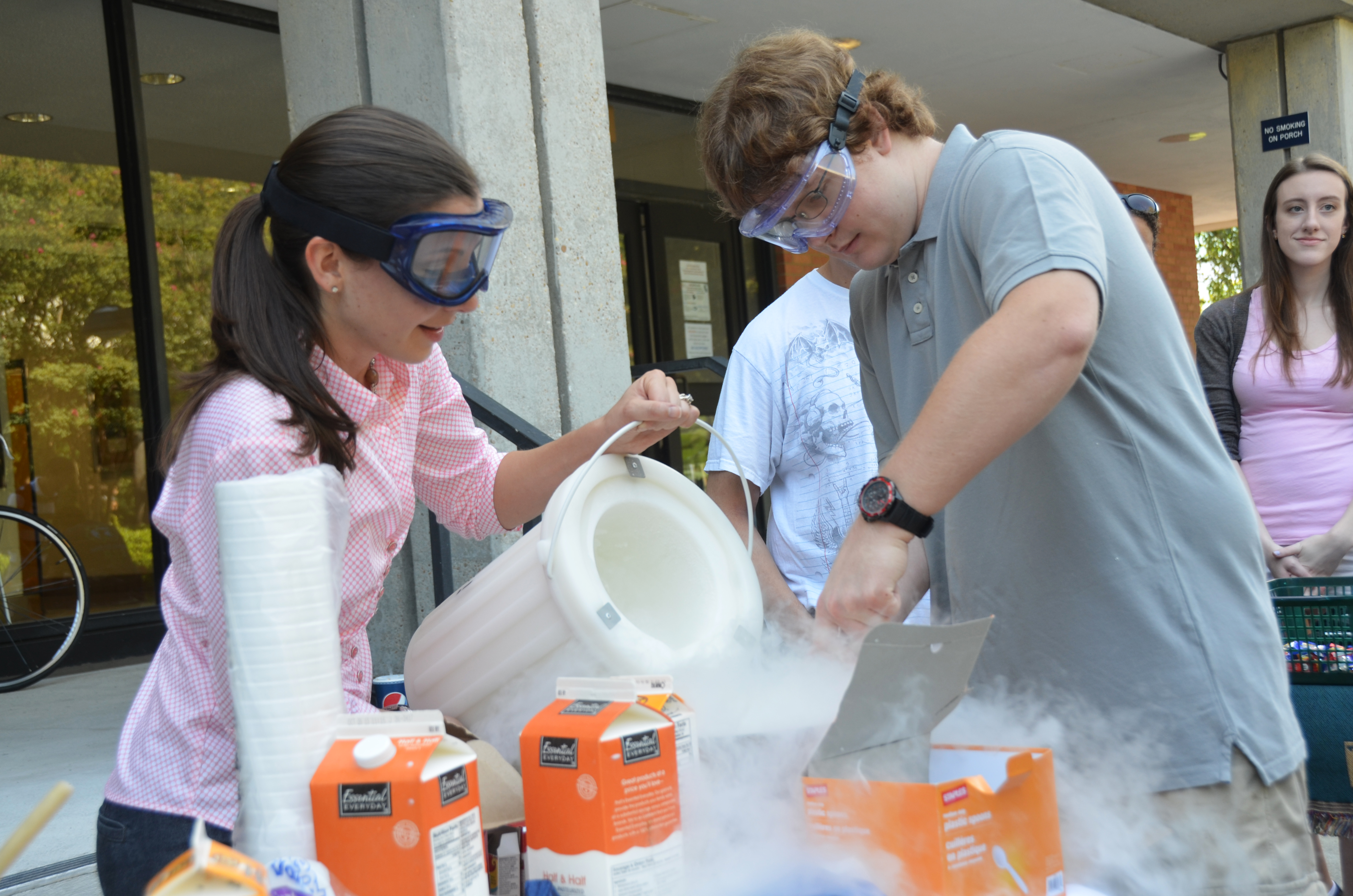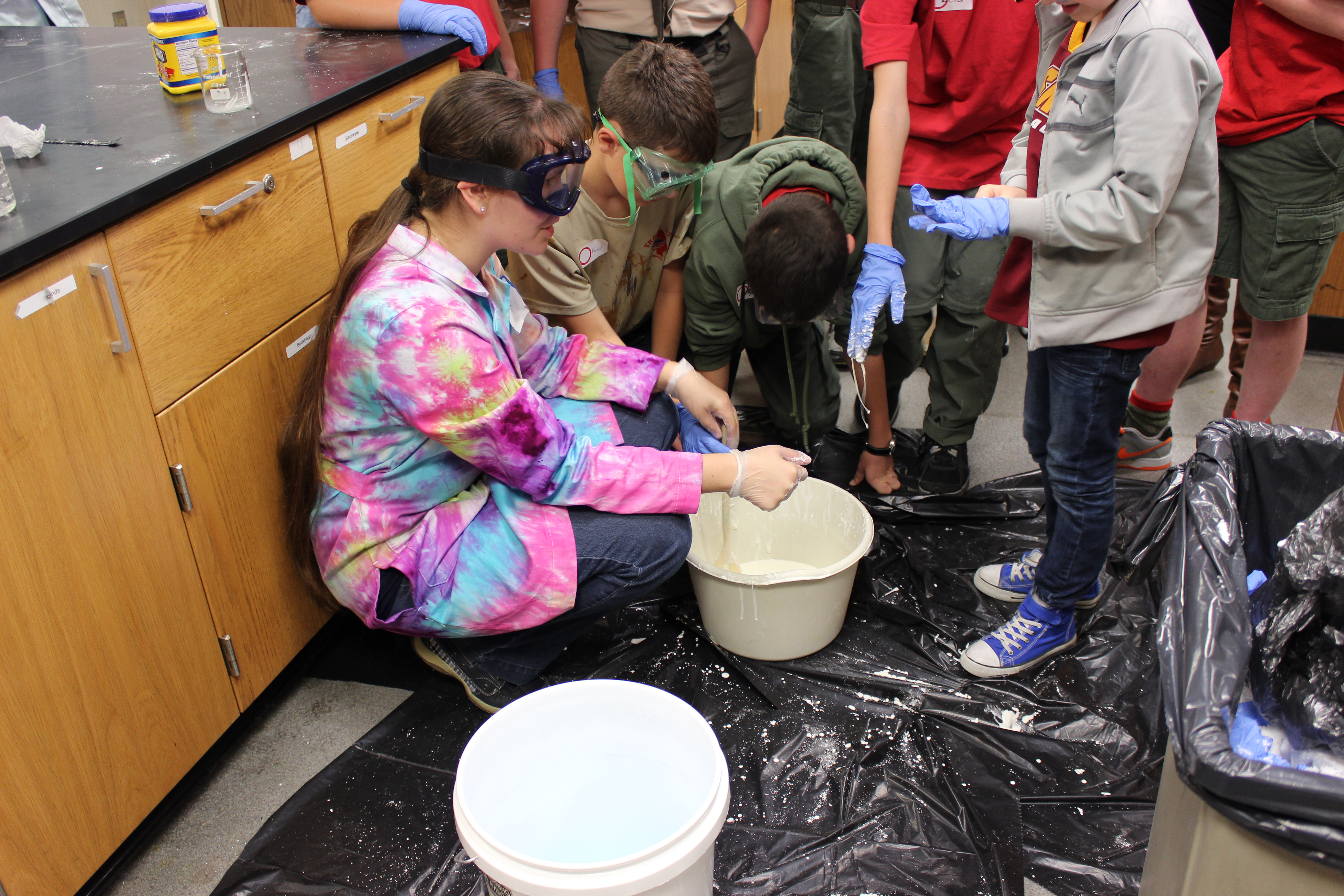National Magazine Features Good Deeds of ODU Chemistry Club
 Melzer, left, prepares a demonstration with Emily Kowalyczyk, current president of the ACS student chapter at ODU.
Melzer, left, prepares a demonstration with Emily Kowalyczyk, current president of the ACS student chapter at ODU.
 Melzer demonstrates how to make ice cream with liquid nitrogen outside the Alfriend Chemistry Building.
Melzer demonstrates how to make ice cream with liquid nitrogen outside the Alfriend Chemistry Building.
 ACS student Deanna Pollard prepares a batch of non-Newtonian fluid (corn starch and water) with a little help from some friends.
ACS student Deanna Pollard prepares a batch of non-Newtonian fluid (corn starch and water) with a little help from some friends.
By Jim Raper
One good deed deserves another for the student chapter of the American Chemical Society (ACS) at Old Dominion.
When the ACS learned about the outreach program through which ODU students and faculty members have helped 350 Boy Scouts from eastern Virginia earn chemistry merit badges, it devoted three pages of its national student magazine, inChemistry, to the project.
An article headlined "Fun, Fire, and Food: How We Help Local Boy Scouts Earn Their Chemistry Merit Badges" is in the issue published this month. The words are illustrated with photos showing how the researchers and scholars in ODU's Department of Chemistry and Biochemistry make their discipline interesting and fun for boys who are in middle school and high school.
Marie Melzer, a lecturer in chemistry at ODU and the faculty adviser for the ACS student chapter, wrote the article together with Kaleigh Wiley, a senior chemistry major who is a former president of the student chapter.
Since 2010, ODU has held twice-a-year Saturday "Scout Day" programs that are chock-full of activities and lessons fulfilling merit badge requirements. The next program is March 29.
So how do you keep boys interested in chemistry during a long day of lectures, lab experiences and so forth?
"You make it fun," said Melzer. That would include experiments in which liquids change colors, glow in the dark and give off smoke. Or a cupcake display in the form of the periodic table of elements. Or a demonstration in which liquid nitrogen is used to make perfectly safe - and darned good - vanilla ice cream.
But a lot of serious instruction is woven into the day, as well, Melzer noted. For example, the Boy Scouts get a big dose of chemical safety instruction, including information about the material safety data sheets (MSDS) that chemists and safety officers have handy whenever they're working with chemicals. The sheets list the melting point, boiling point, flash point, toxicity, proper disposal, spill-handling procedures and other critical data about a chemical or chemical compound.
The scouts also are allowed to conduct their own experiments, but only after they have been fitted with the proper goggles, plastic gloves and other protective gear.
"For scouts and scout leaders, the requirements of the chemistry merit badge can be daunting and confusing," Melzer said.
That is exactly what Joe Colby, the merit badge counselor for Troop 256 in the Three Rivers District of the Tidewater Council of the Boy Scouts, explains in a brief sidebar story that appears with the main inChemistry article. Colby, an IT administrator with NOAA who lives in Chesapeake, writes that he contacted ODU after he took the counselor position and realized just how difficult it was for boys to meet merit badge requirements in disciplines such as chemistry and law.
"I realized that our community could support these and other merit badges, thereby introducing scouts to colleges and businesses. I contacted the chemistry department at ODU to see if they could help us with the chemistry merit badge, and thus a partnership began," Colby wrote.
Scouts always come away with a "positive impact" from a host group such as the ODU chemistry team, he added. "The boys see the college students in a casual learning environment, and learning becomes easy and non-threatening."
Most of the several dozen ODU faculty members and students who run each "Scout Day" are assigned to four labs that the scouts rotate through.
In "kitchen lab" the participants learn chemical basics of cooking, such as how the starches and sugars in onions can make the vegetable taste different when raw, browned or caramelized. The "environmental lab" includes a lecture about types of chemical pollution and the roles of government agencies that protect the environment. The "fire lab," which usually elicits the most "oohs and aahs," according to Melzer, includes a demonstration of how fireworks exploit the emission spectrum of various compounds through colored flames. Finally, in the "fun lab," the scouts experience glow-in-the-dark and foaming reactions.
After a pizza lunch comes the ice cream, which is frozen nearly instantly by liquid nitrogen, and the cupcakes from the periodic table. In the afternoon, there is a free-ranging "interview a chemist" session, in which a panel of ODU chemists explain their work and answer questions.
"This is ... an insanely fun, educational, crazy and rewarding day," Melzer and Wiley write in the conclusion of their article. "During a time in the semester when students are bogged down with long hours of homework, midterms and lab reports, this day reminds them about the fun and excitement of chemistry. While we are honored to provide the requirements for the Boy Scouts to earn their merit badge, the ACS undergraduates are also served by the opportunity to teach others and enthuse the younger generation about chemistry... . And the opportunity to make liquid nitrogen ice cream is always a bonus."

